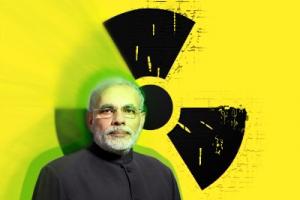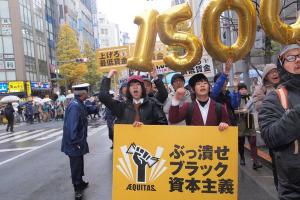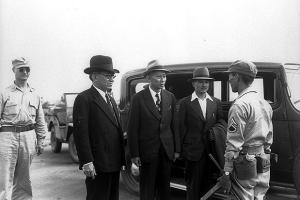Listen to the Governor of Okinawa
Foreign Policy in Focus
 By roping India and Japan into its standoff with China, the U.S. is raising the nuclear stakes in Asia — including, dangerously, between India and Pakistan. With the world focused on the scary possibility of war on the Korean Peninsula, not many people paid much attention to a series of naval exercises this past July in the Malacca Strait, a 550-mile long passage between Sumatra and Malaysia through which pass over 50,000 ships a year.
By roping India and Japan into its standoff with China, the U.S. is raising the nuclear stakes in Asia — including, dangerously, between India and Pakistan. With the world focused on the scary possibility of war on the Korean Peninsula, not many people paid much attention to a series of naval exercises this past July in the Malacca Strait, a 550-mile long passage between Sumatra and Malaysia through which pass over 50,000 ships a year.
 Japanese activists have launched their own Fight for $15 movement, calling for a national minimum wage of 1500 yen per hour. The activists were inspired by the US movement, but also many of them were moved to get involved in social justice work after the Fukushima nuclear disaster in 2011. The movement wants to raise wages but also build a broader movement to counter the growing right-wing and anti-immigrant forces in Japan.
Japanese activists have launched their own Fight for $15 movement, calling for a national minimum wage of 1500 yen per hour. The activists were inspired by the US movement, but also many of them were moved to get involved in social justice work after the Fukushima nuclear disaster in 2011. The movement wants to raise wages but also build a broader movement to counter the growing right-wing and anti-immigrant forces in Japan.
 The spread of capitalism as a global system and neoliberalism as its dominant economic policy has its analogue in the triumph of English as its undisputed enabling linguistic. The book under review argues that not only is this single-language sway historically unprecedented in allowing universal communication, but that its flattening effects on native languages and national discourse come with their own disabling downsides.
The spread of capitalism as a global system and neoliberalism as its dominant economic policy has its analogue in the triumph of English as its undisputed enabling linguistic. The book under review argues that not only is this single-language sway historically unprecedented in allowing universal communication, but that its flattening effects on native languages and national discourse come with their own disabling downsides.
 Postwar U.S. authorities helped rehabilitate erstwhile collaborators with the Japanese occupation in the name of fighting communism. Generations later, it’s led to the grandson of a despised Philippine collaborator endorsing the re-militarization of his country’s former occupiers — by the grandson of a war criminal, no less.
Postwar U.S. authorities helped rehabilitate erstwhile collaborators with the Japanese occupation in the name of fighting communism. Generations later, it’s led to the grandson of a despised Philippine collaborator endorsing the re-militarization of his country’s former occupiers — by the grandson of a war criminal, no less.
 The United States and European allies have launched wars on the Middle East creating an enormous refugee crisis. The same nations threaten Russia. The question of maintaining peace with Iran is on the tip of everyone's tongue. Even in Asia, Pacific and Africa, the biggest military buildup is by the U.S. So why does Japan, of all places, have streets full of antiwar demonstrations for the first time since the U.S. war on Vietnam?
The United States and European allies have launched wars on the Middle East creating an enormous refugee crisis. The same nations threaten Russia. The question of maintaining peace with Iran is on the tip of everyone's tongue. Even in Asia, Pacific and Africa, the biggest military buildup is by the U.S. So why does Japan, of all places, have streets full of antiwar demonstrations for the first time since the U.S. war on Vietnam?
Spread the word